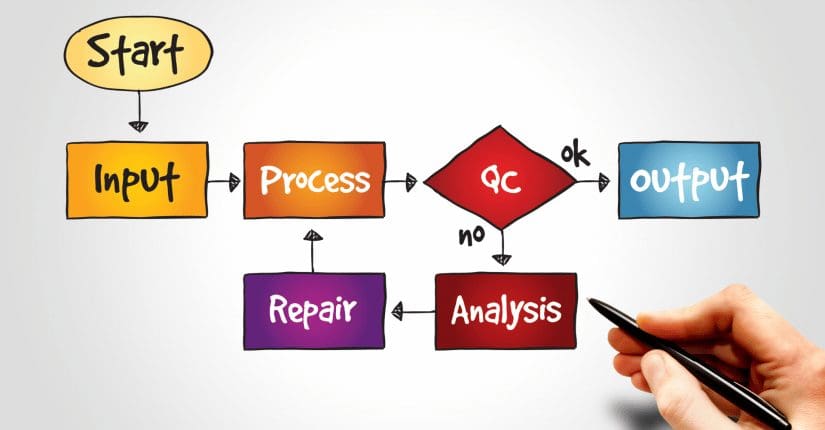How to Hire a Business Process Analyst: A Recruiter’s Guide to Business Efficiency?

Do you need to hire a business process analyst? Here’s a recruiter’s guide to business process analyst job description, what you should know about business process analysts, and what they do to streamline your business to improve efficiency.
If your company is tired of dealing with disorganized and inefficient business processes, it likely needs a business process analyst to streamline operations and improve the bottom line.
This blog post will discuss tips that will help you streamline your business processes, improve efficiency, and successfully hire for this role. Follow these tips on how to hire a business process analyst who can help you run your business like a well-oiled machine!
What Are Business Processes?
A business process is a set of activities that aim to achieve a specific goal. For example, the goal of marketing may be to increase sales, and the activities involved in marketing might include market research, product development, advertising, and customer service.
Business processes can be manual or automated. People do manual processes, while computers do automated processes. Automated processes are often much faster and more accurate than manual processes. However, automated processes can also be expensive to develop and maintain. Read further to learn about the job description for the business process analyst position.
What is Business Process Management?
Business Process Management (BPM) is a field of management concerned with designing, analyzing, improving, and managing business processes. It covers all aspects of business operations from initial conception to final execution.
BPM aims to improve organizational performance by making the flow of work through an organization visible and controllable. It does this by identifying, mapping, and optimizing the sequence of activities that create value for customers or clients. BPM is all about an iterative plan, do, check, and act (PDCA) process, and it provides a framework for understanding how work flows through an organization and how improvements can be made.
Business Processes: The Basics
Now that we know business processes, let’s look at some basics. There are four basic steps in any business process:
Input: This is the data or information needed to complete the process.
Processing: This is where the work is done. This may involve decision-making, calculations, or other types of work.
Output: This is the result of the processing step. It may be a product, service, or information.
Control: This step ensures that the process works as it should and makes any necessary adjustments.
These four steps are essential to any business process, whether simple or complex. By understanding these steps, you can streamline your business processes for greater efficiency.
Most Common Types of Business Processes
A few business processes are commonly used in organizations, as seen by business process mapping. These include:
Accounts payable process
This is the process of paying invoices received from vendors and suppliers. It usually includes verifying the invoice’s accuracy, getting approval from the appropriate manager, and making the payment.
Accounts receivable process
This is billing customers and collecting payments for goods or services. This usually includes creating invoices, sending billings, and following up on past-due payments.
Order processing
This is the process of taking customer orders and fulfilling them. This usually includes taking the order, preparing the product or service, and shipping it to the customer.
Human resources process
This is managing employee records and ensuring all HR-related activities are completed promptly and accurately. This usually includes maintaining employee files, tracking vacation and sick days, and processing payroll.
Many other types of business processes are not listed here. However, these are some of the most common ones used in organizations. Stripping these processes will help improve your business’s efficiency. Make sure to measure process performance.
How to Streamline Business Processes?
Now that we’ve discussed some of the basics of business processes let’s look at how you can streamline them for greater efficiency. There are a few different ways that you can streamline your business processes:
Automate whenever possible
A significant part of the business process analyst job description is to automate processes wherever possible. As mentioned earlier, business process automation is often much more efficient than manual processes and is a key to business process improvement.
Whenever you can, look for ways to automate business processes; this could involve investing in new software or simply changing how you do things.
For example, if you manually input data into a spreadsheet, see if you can connect your software to automatically enter the data.
Automating your processes will save you time and effort in the long run.
Eliminate unnecessary steps
Another way to streamline your business processes is to eliminate any unnecessary steps. Business processes can become convoluted as new people are added to the team or new software is introduced.
Look closely at your business processes and see if any steps could be eliminated. Streamlining your process will make it more efficient and easier to follow.
Standardize where possible
Another aspect of the job description of a business process analyst is standardization. One way to improve efficiency is to standardize operations where possible. This means having a set way of doing things everyone on the team knows.
For example, if you have a process for onboarding new employees, ensure that everyone on the team knows exactly what needs to be done and in what order. By standardizing your processes, you’ll avoid any confusion or wasted time.
These are just a few ways to streamline your business processes. By taking these steps, you’ll improve the efficiency of management processes and get more done in less time. Business process software can help improve business process monitoring.
Why Streamlining Business Processes Important?
Business processes say a lot about your business and its efficiency. There are many reasons why streamlining business processes is important. For one, business process analysis can help improve a company’s efficiency and productivity. When processes are streamlined, it’s easier for employees to know what needs to be done and when. This can lead to fewer mistakes and less time wasted overall.
Another reason streamlining business processes is important is that it can help improve customer satisfaction. Streamlined processes can mean faster turnaround times for orders, keeping customers happy. In addition, when processes are well-organized and easy to follow, it’s more likely that customers will have a positive experience with your company overall.
Finally, streamlining business processes can also help to save money. When processes are more efficient, it often leads to cost savings. For example, automating a process that previously required manual input will save time and money in the long run.
Benefits Of Streamlining Business Processes
There are many benefits of streamlining business processes. Here are just a few of the most notable ones:
Improved efficiency and productivity
As we mentioned earlier, streamlining business processes can improve efficiency and productivity. When processes are streamlined, it’s easier for employees to understand what they need to do and how they need to do it. This can lead to fewer mistakes and faster task completion.
Reduced costs
Another benefit of streamlining business processes is that it can help reduce costs. When businesses can streamline their processes, they often find that they don’t need to spend as much on labor and materials, leading to significant savings over time.
Improved customer satisfaction
Finally, streamlining business processes can also improve customer satisfaction. When businesses can provide their customers with a better experience, they’re more likely to be satisfied with the overall product or service. This can lead to repeat business and referrals, which can be extremely valuable.
As you can see, streamlining business processes has many benefits. Streamlining your business process management strategy is a great start if you’re looking to improve efficiency and productivity, reduce costs, or improve customer satisfaction. Make sure to improve existing processes.
Requirements To Be A Business Process Analyst
If you are considering a career as a business process analyst, you will need specific skills and requirements to succeed in this role. Here is a look at some of the key requirements for this position:
Excellent analytical and problem-solving skills: As a business process analyst, you will analyze complex business problems and devise creative solutions to improve efficiency and effectiveness.
Strong communication and interpersonal skills: You must communicate your findings and recommendations effectively to technical and non-technical staff.
Experience with business process modeling: This will be one of your primary responsibilities, so experience with modeling tools and techniques is essential.
Project management experience: A business process analyst’s job description may also include leading or participating in improvement projects, so project management experience is a plus.
Degree in business administration or a related field: While not required, many employers prefer candidates with a degree in business or a related field.
If you have the requisite skills and experience, a career as a business process analyst can be very rewarding. You will be critical in improving organizational efficiency and effectiveness, and your work will directly impact the bottom line.
How to Hire a Business Process Analyst?
If you want to hire a business process analyst, keep a few things in mind. Here is a look at some tips for finding the right analyst for your business:
Define the scope of the project
Before you start your search for a business process analyst, it is vital to have a clear understanding of the project’s scope. What exactly do you need help with? What are your goals for the project? Once you have a good idea of what you need, you can look for someone with the skills and experience to help you achieve your goals.
Look for someone with the right skills and experience
Not all business process analysts are created equal. When looking for the right analyst for your project, look for someone with the skills and expertise necessary to meet your needs.
Ask for references and check them out. Ensure the analyst you are considering understands business processes well and is current on the latest tools and techniques.
Get a proposal
Once you have found a few analysts with whom you are interested in working, be sure to request proposals from each one.
This will allow you to see how they would approach your project and what they would charge. Comparing proposals is essential before making a final decision.
Make sure there is good communication
Communication is critical when working with any consultant. Ensure you are comfortable communicating with the analyst you are considering hiring. There should be no surprises when it comes to communication. You should both be on the same page from the start.
By following these tips, you can be sure that you find the right business process analyst for your needs. Remember, finding the right fit will save you time and money in the long run.
The fundamental goal behind the job description of a business process analyst is to streamline business processes, which can help improve efficiency and productivity. Without Efficient processes, all business operational processes will become inefficient.
While there are many ways to go about this, we have outlined four tips to get you started. Keep this in mind for any business process modeling you do. We hope you got a lot out of our recruiter’s guide to business process analysts.
Looking for a business analyst? Here PMWorld 360 Magazine’s job board, we offer job packages to attract top talent. Register for a recruiter/employer account today and post your next job with us —where our audience consists of business leaders, project management professionals, and business process analysts.
PMWorld 360 Partner, IPM, Offers Online Project Management Certification:
PMWorld 360 Magazine partnered with the Institute of Project Management (IPM) to help employees grow and advance through certification in project management! Check out their courses and certifications.
Get More Career Insights From Our Career and Recruiting Blog
Our Project Management Magazine
For Project Management Best Practices: Articles, Podcasts, Templates, Calculators


